|
1997
MP3.com is launched in November
by Michael Robertson, who purchased the domain name from California
Internet entrepreneur Martin Paul for $1000. The site offers 3000 songs
free for download, and grows in time to become the first music site on the
Internet with over three million hits per month.
1998
Emusic.com
invents online MP3 sales
when it becomes the first commercial website to sell singles and albums in
the MP3 format.
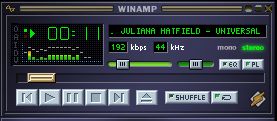
The
Winamp MP3 player is born when
Justin Frankel and Dmitry Boldyrev of the University of Utah program a
Windows interface to the “AMP MP3 Playback Engine” that had begun to
circulate the Internet. The Amp player had been created the previous year
by Tomislav Uzelac of Advanced Multimedia Products (AMP). When Frankel
and Boldyrev offer Winamp for free on the Internet, the true MP3
revolution begins.
The
Recording Industry Association of America (RIAA) attempts to block Diamond
Multimedia Systems from releasing Rio, the world's
first portable MP3 player. The
RIAA drops the suit in August 1999, but the claim marks the beginning of
the greater public’s awareness of the MP3 format.
The
practice of purchasing domain names relating to trademarks and then
selling them for huge prices is banned a U.S. court.
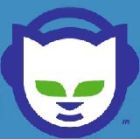
1999
January 1999
"MP3"
overtakes "sex" as the top search term on the Internet.
Shawn
Fanning begins to work on Napster
software.
February 1999
The
Secure Digital Music Initiative
is begun by the recording industry with help from Microsoft and IBM to
kill the MP3 and replace it with a piracy-proof digital audio standard.
March 1999
150,000
copies of Tom Petty’s "Free Girl Now" single are downloaded from MP3.com
when Petty posts the song for free. Warner Bros. Records, Petty's label,
orders the song removed less than two weeks later.
May 1999
Just by
chance he crossed a diamond with a pearl, and turned it on the world.
Nineteen-year-old Northeastern University freshman Shawn Fanning combined
the file-sharing capabilities of Microsoft Windows, the searching and
filtering functions of classic web-based search engines and the instant
messaging abilities of Internet Relay Chat, and
peer-to-peer (P2P) file sharing
was born. The service,
called Napster, enabled
anyone with a web connection to find and download shared files (usually
MP3’s) on the hard drives of millions of other users. The service
exploded onto college campuses, where many students have easy access to
high-speed Internet connections, and soon spread home to parents and
across the nation. Napster soon became the fastest growing home software
application, and the fastest growing Internet phenomenon, in history.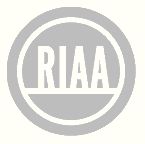
August 1999
The RIAA
drops its suit against Diamond Multimedia, freeing Diamond to release the
Rio PMP300 portable MP3 player. The device sold for $200 and had 32MB of
space.
September 1999
David
Bowie, with approval from EMI's Virgin Records, puts his album “Hours” on
the Internet for purchase and download. The event marks the first time a
major record label authorized the digital distribution of copyrighted
music.
December 7, 1999
A day that
will live in infamy. The Recording Industry Association of America (RIAA)
files a lawsuit against Napster (and several universities) in the San
Francisco U.S. District Court on grounds of encouraging copyright
infringement, calling the service “a haven for music piracy on an
unprecedented scale.” The plaintiffs in the suit, including several major
record labels like Universal Music, Bertelsmann AG (BMG), Sony Music, EMI,
and AOL Time Warner, request damages of $100,000 for each time a song is
copied.
2000
The number
of hosts on the Internet crosses
100,000,000.
January 2000
MP3.com
introduces the My.MP3.com
personal jukebox. The system enables users to upload copies of their CD
collection and listen to it anywhere in the world over the Internet.
80,000 CDs are uploaded into MP3.com’s database. The major record labels,
under the RIAA, soon file suit, arguing the system violates copyright
law.
March 2000

Gnutella
is released by Winamp MP3 player creator Justin Frankel and Tom
Pepper of Nullsoft (a division of AOL). The program is a new kind of
file-sharing system that does not rely on a central server to distribute
files. Although AOL attempts to pull the program, copies escape to the
Internet and are soon in use by the public.
MP3.com is sued by the National
Music Publishers' Association for use of its members’ songs.
April 2000
Sony Music
offers digital downloads of singles in the USA, the first major label to
do so.
Both
Metallica and
Dr. Dre file copyright
infringement suits against Napster.
Limp Bizkit announces free
concert tour sponsored by Napster.
A U.S.
District Court Judge rules that MP3.com is in violation of copyright law,
by creating a database of copyrighted music for commercial sale. Four of
the five major record labels in the suit later settle licensing deals with
MP3.com for $20 million each.
May 3, 2000
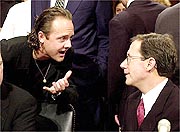
Metallica
drummer Lars Ulrich and the group's attorney show up at the door of the
Napster offices in San Mateo, California. In their hand is a list of
335,000 Napster users that are offering Metallica songs for download. The
two demand that the users be blocked from the site. Napster agrees, but
many users simply re-enter with a different user name. Later, Ulrich
later is booed on the MTV Music Video Awards.
May 5, 2000
San
Francisco U.S. District Judge Marilyn Hall Patel rules that rules that
Napster is in violation of the Digital Millennium Copyright Act (DMCA) of
1998. The act makes it illegal to make available to the public products
or devices that enable people to disable technologies used encrypt or
otherwise protect copyrighted materials.
July 2000
File-sharing service Scour
is sued by The Recording Industry Association of America (RIAA) for
copyright infringement.
July 26, 2000
San
Francisco U.S. District Judge Marilyn Hall Patel, issues an injunction
against Napster, ordering the company to prohibit copyrighted songs from
appearing on its online file-sharing service within three days. In her
decision, Patel states that Napster was enabling “wholesale infringing” by
its users of music industry copyright. Napster’s legal team appeals the
decision to the 9th Circuit Court of Appeals. Web traffic at Napster
increases 71 percent the next day as users attempt scramble to take
advantage of the service before it is likely shut down.
July 28, 2000
Napster’s
appeal is successful, as 9th U.S. Circuit Court of Appeals stays the
injunction and overturns the ruling of the U.S. District Court. Napster
is able to stay in operation until the outcome of the trial.

September 2000
New
file-sharing software called KaZaA
is invented by FastTrack, based in Amsterdam.
October 2000
MP3.com and
The National Music Publishers' Association announce a $30 million
settlement, in which MP3.com is allowed to distribute over 1,000,000 songs
through its new service, My.MP3.com.
October 2, 2000
The RIAA
appeals to the U.S. Circuit Court of Appeals in San Francisco, to
reinstate the injunction against Napster by the U.S. District Court, which
declared that Napster was in violation of copyright law. Napster denies
the charge.
October 31, 2000
Napster
announces that it will partner with Bertelsmann AG (parent company of
BMG), one of the record companies involved in the Napster lawsuit. The
two will develop a subscription-based music downloading service,
guaranteeing payments to artists. Bertelsmann will drop out of the RIAA
lawsuit, and will make its music catalogue (the fourth largest in the
world) available to Napster. In exchange, Bertelsmann will receive an
equity stake in Napster, which at this point has over 38 million users.
2001
January 29, 2001
Bertelsmann
AG announces that Napster will introduce a subscription fee for users
beginning in summer 2001.
February 12, 2001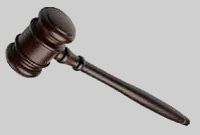
The 9th
U.S. Circuit Court of Appeals rules that Napster users are illegally
distributing copyrighted music, and that Napster knew its users were
violating copyright laws through its service. The court orders Napster to
stop its users from trading and distributing copyrighted material, but
allows the company to stay in operation until U.S. District Judge Marilyn
Hall Patel can re-draft her injunction to comply with the appellate
court's decision.
February 20, 2001
Napster
offers a $1 billion settlement to the five major record labels as well as
several independent labels. The offer is eventually rejected.
March 2, 2001
U.S.
District Judge Marilyn Hall Patel issues an injunction against Napster,
requiring the service to block the exchange of all copyrighted works
between its 60+ million users. However, Judge Patel requires the record
companies to provide exact file names of the copyrighted songs to be
removed.
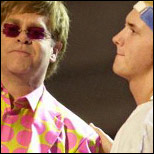
March 5, 2001
National
Academy of Recording Arts & Sciences, Inc. files suit in the U.S. District
Court in San Francisco against Napster for allowing the exchange copies of
Eminem and Elton John's duet of “Stan,” which had been performed at the
43rd Annual GRAMMY telecast two weeks earlier. The Academy drops plans to
sell singles from the telecast.
Napster
voluntarily begins blocking the exchange of copyrighted material on its
service, by blocking all songs listed on the Billboard Hot 100 singles
chart and the Billboard 200 album chart.
March 9, 2001
The RIAA
gives Napster a list of the song titles, artist names and file names of
135,000 copyrighted songs the five major record labels want removed from
the service. Immediately, users simply scramble the letters in file names
to overcome the filtering.
March 13, 2001
Napster
announces that it will employ the file-recognition services of a company
called Gracenote to increase its ability to remove files that have been
intentionally misspelled or scrambled.
March 27, 2001
The RIAA
files a brief with the U.S. District Court claiming Napster is still
allowing the exchange of copyrighted material, and has not complied with
the injunction set forth by Judge Patel.
April 10, 2001
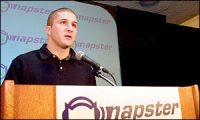 In
a hearing to evaluate the progress the company is making in blocking
copyrighted files, calls Napster an out-of-control "monster" that needs to
be shut down, adding that Napster's earlier efforts to comply with her
previous ruling were "disgraceful." Napster says it has been
difficult to filter out all of the permutations of the copyrighted songs,
as users constantly change the file names. In
a hearing to evaluate the progress the company is making in blocking
copyrighted files, calls Napster an out-of-control "monster" that needs to
be shut down, adding that Napster's earlier efforts to comply with her
previous ruling were "disgraceful." Napster says it has been
difficult to filter out all of the permutations of the copyrighted songs,
as users constantly change the file names.
April 20, 2001
Napster
begins to use a new method to filter songs, called “acoustic
fingerprinting.” The technology was developed by a company called
Relatable, and identifies a song by its wavelength pattern, overcoming the
need to identify all versions of the file name.
April 27, 2001
U.S.
District Judge Marilyn Hall Patel asks the 9th Circuit Court of Appeals to
clarify whether the recording companies need to provide Napster with exact
file names (as Patel had ordered), or just the song titles (as the record
companies preferred) of songs to be removed.
June 5, 2001
Napster
announces a deal with EMI, BMG, and Warner Music to distribute their music
catalogs through a service to be called MusicNet. The service will
compete with Sony Music and Vivendi Universal’s service Pressplay. Each
group races to launch before the other. MusicNet launches on December 11,
2001, and Pressplay launches just eight days later on December 19.
June 26, 2001
A group of
150 independent record labels from Great Britain sign on to be a part of
Napster's upcoming subscription service MusicNet.
July 2, 2001
Napster
shuts down as Judge Patel orders Napster to remain offline until it can
prove it is 100 percent free of copyrighted material.
July 11, 2001
Napster
tells Judge Patel that it can be 99 percent free of copyrighted material,
and asks to be allowed resume operations. Judge Patel refuses, requiring
the service prove it is 100 percent free of copyrighted works. Napster
declares her position to be in opposition to the ruling of the 9th Circuit
Court of Appeals, and immediately appeals her ruling.
July 12, 2001
Metallica
and Dr. Dre both settle their lawsuits with Napster.
July 18, 2001
The 9th
Circuit Court of Appeals again reverses the ruling of Judge Patel, and
allows Napster to go back online. The service remains effectively
castrated however, as it continues to block the exchange of most
copyrighted music.
NEXT SECTION
GO TO:
Introduction
PART
I: The Dark Ages: When Time Stood Still
PART
II: Dawn of the Computer Age
PART
III: Dawn of the Internet
PART
IV: The Rise of (and Battle Over) the MP3
PART
V: Life After Napster
|